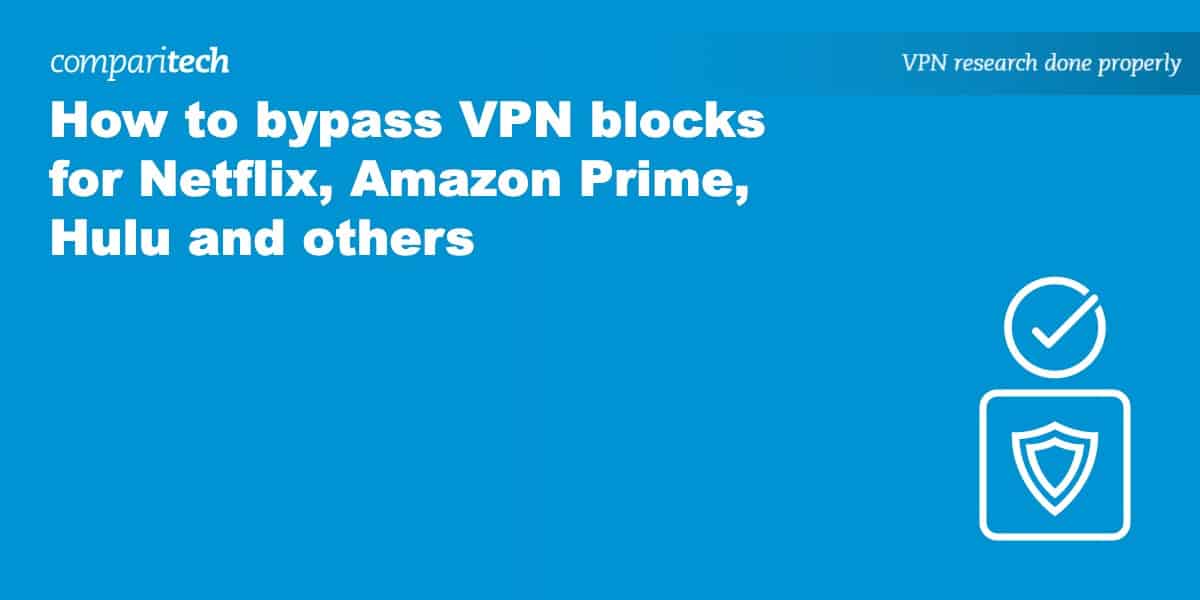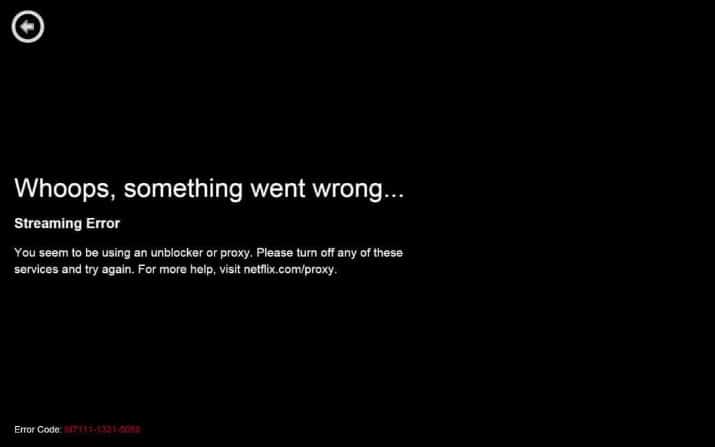- Many streaming services only allows users within certain countries to access and view content but strict VPN detection mechanisms mean that, even when using a VPN, you may be blocked.
- Streaming services constantly work to detect and ban VPNs but a few VPNs invest in keeping users totally anonymous and avoiding these blocks.
- We regularly test the 78 best-known VPNs to find which reliably unblock the main streaming services including Netflix, iPlayer and Amazon Prime.
- NordVPN is our top recommendation for streaming. It avoids blocking by all major streaming platforms and is risk free with a 30-day money-back guarantee.
Streaming services like Netflix and Amazon Prime vary their content from one location to another. This can be frustrating when, for example, that movie you’re desperate to watch is available everywhere except in your country. However, it’s not quite as bad as it seems. A Virtual Private Network (VPN) can help bypass VPN blocks and access geo-restricted content.
So how does this work? Well, the sites you visit use your IP address to determine your location. When you connect to a VPN server, platforms like Netflix can only see the server’s IP address, which may well point to another country entirely. As such, you’re able to access any content that is available wherever your server is located.
Unfortunately, not all VPNs are good for accessing geo-restricted content. In fact, most are quickly detected and blocked. To find out which VPNs do work, we’ve tested a range of popular providers with the most difficult-to-access streaming services. We’ll explain what makes these services good options for streaming, as well as how and why streaming platforms try to block them.
Here’s how to bypass VPN blocks on Netflix and other platforms
Ironically, all you have to do to bypass VPN blocks is to use a better VPN. Below, we’ll walk you through the process step-by-step.
From our experience, here’s how to get around VPN blocks on Netflix and all your favorite streaming services:
- First, sign up for a reputable VPN that’s suitable for streaming. We recommend NordVPN, but Surfshark and IPVanish are strong alternatives to bypass VPN blocks.
- Download the appropriate version of the app for your device, then log in.
- Connect to a VPN server in the required country. For instance, you’d use an American server to access Netflix US or a British server for BBC iPlayer.

Pay close attention to your chosen server’s location, as this determines which country’s content you’ll be able to access. - Finally, play a video on your chosen service. It should begin immediately; if not, clear your browser’s cookies and cache, then reload the page. If problems persist, contact your VPN’s customer support team to see if there’s a specific server you should use.
WANT TO TRY THE TOP VPN RISK FREE?
NordVPN is offering a fully-featured risk-free 30-day trial if you sign up at this page. You can use the VPN rated #1 for unblocking stubborn services with no restrictions for a month—great if you want to bypass VPN blocks.
There are no hidden terms—just contact support within 30 days if you decide NordVPN isn't right for you and you'll get a full refund. Start your NordVPN trial here.
The best VPNs for bypassing blocks on Amazon Prime, Netflix, and others
Based on the results of our tests — which you can read about in detail later — these are the best VPNs for bypassing blocks:
- NordVPN: The best way to bypass VPN blocks. Works with Netflix, Prime Video, and more. Can be used to overcome censorship in places like China and the UAE. Includes a 30-day money-back guarantee.
TIP In our testing we found that the cheapest NordVPN plan (Standard) works perfectly for bypassing VPN blocks. - Surfshark: The best budget choice for bypassing VPN restrictions. Works with a wide range of Netflix libraries and virtually every other major streaming service. Boasts very fast speeds and has no connection limit.
- IPVanish: Strong streaming abilities and secure servers in dozens of countries. Very easy to use and capable of protecting every device you own.
- ExpressVPN: No-logs VPN with a huge network and steady speeds. Automatic obfuscation makes it easy to beat VPN blocks or strict online censorship.
- CyberGhost: Streaming-optimized servers that simplify access to streaming platforms. Robust security and privacy. Great for users with no VPN experience.
- PureVPN: A simple, straightforward VPN with beginner-friendly apps and strong security. Excels at beating online restrictions and evading detection.
- ProtonVPN: Secure and private connections via servers in over 100 countries. Works great with Netflix, Hulu, and Amazon Prime Video. Doesn’t keep logs.
- PrivateVPN: An excellent option for sidestepping VPN-blocking measures. Major emphasis on privacy, plus the ability to access most streaming apps.
Many VPNs claim to work with bypassing VPN blocks but most (especially free VPNs) are often blocked.
We regularly test the top 70 VPNs with all major streaming sites and this list only includes VPNs which reliably unblock bypassing VPN blocks and offer a full money-back guarantee, allowing you to try them risk-free.
Best VPNs for bypassing VPN blocks: Our hands-on review
We’ve tested and compared the most important features of the top VPNs here. Prefer to read the in-depth reviews? Start with NordVPN – our #1 choice for bypassing VPN blocks.
| No value | NordVPN | Surfshark | IPVanish | ExpressVPN | CyberGhost | PureVPN | Proton VPN | PrivateVPN |
| Website | NordVPN.com | Surfshark.com | IPVanish.com | ExpressVPN.com | Cyberghost.com | PureVPN.com | ProtonVPN.com | PrivateVPN.com | Ranking for bypassing VPN blocks | 1 | 2 | 3 | 4 | 5 | 6 | 7 | 8 | Unblocks Netflix US | Unblocks Prime Video | Works in China | Devices Supported | Windows, MacOS, iOS, Android, Linux | Windows, MacOS, iOS, Android, Linux, Amazon Fire TV, Apple TV | Windows, MacOS, iOS, Android | Windows, MacOS, iOS, Android, Linux, Smart TVs, Routers | Windows, MacOS, Linux, iOS, Android | Windows, MacOS, iOS, Android, Smart TVs, Chromebook, Routers | Windows, Linux, MacOS, iOS, Android, Chromebook | Windows, MacOS, iOS, Android, Amazon Fire TV | Total number of servers | 7,425 | 3,200 | 2,400 | Undisclosed | 8,000+ | 6,000+ | 12,660 | 200+ |
|---|---|---|---|---|---|---|---|---|
| Best deal (per month) | $3.39 Up to 76% off 2 year plans + free Amazon Gift Card | $1.99 87% OFF + 3 months free | $6.49 Best MONTHLY deal | $4.99 SAVE: 61% + 4 months free on 2 year plans | $2.19 SAVE 83% on the 2 year plan + 2 months free! | $2.16 83% off the 5-yr standard plan | $3.59 SAVE 64% on a 2-year plan | $2.00 Save 85% on a one year plan + 24-months free |
How services detect and block VPNs
There are several ways to tell if a user is connected to a VPN or proxy, and new methods are always being designed. Below, we’ll discuss a few of the most common:
Using GPS data
Accessing region-locked services like Netflix is much more difficult when using a cell phone or tablet. This is because mobile devices collect a lot of information that desktop computers don’t, including your current GPS location. For instance, if your GPS and IP address say you’re in the US, you likely are. On the other hand, if you have an American IP address but your GPS data says you’re in France, you’re almost certainly using a Virtual Private Network (VPN).
Checking a known VPN blacklist
Most streaming platforms keep a list of IP addresses from known VPN services. This kind of IP blocking tends to be more effective against free VPNs or those with small networks since it’s a dead giveaway when the same IP address is used to log into hundreds of Netflix accounts in 24 hours.
However, IP address blacklisting does very little to stop major VPN providers. With a vast server network, users can usually find a working server without too much trouble. Further, the fact that a well-known VPN can bypass IP-based VPN blocks on even the notoriously stubborn service could attract more customers.
Blocking traffic from specific ports
When you browse the internet, you’re sending data to the server of whatever website you’re on. This server has various ports configured to accept different kinds of traffic, for instance, most accept HTTP traffic on port 80, or HTTPS traffic via port 443. However, some VPN protocols have their own specific ports. This means, for example, that if a website wants to block PPTP connections completely, all it has to do is block the port that the PPTP protocol uses: port 1723.
Of course, there are ways around port-blocking. Some VPNs offer features that scramble your data and disguise it as regular HTTP traffic, neatly side-stepping this problem. Additionally, services would have to block numerous ports to cater to all available VPN protocols, which could prevent legitimate users from accessing the service.
Deep packet inspection
Streaming services don’t use this method. Instead, it’s mostly used by Internet Service Providers (ISPs) in countries where the Internet is heavily restricted or VPN usage is banned. Effectively, this technology examines the user’s internet traffic and filters it based on predetermined rules. For example, if you’re attempting to send VPN traffic via the standard HTTP port, this can be detected and stopped.
The easiest way to beat deep packet inspection is to use a VPN with advanced cloaking technology. VPNs encrypt your data, meaning nobody (not even the government) can see what you get up to online, and cloaking features reshape your traffic, hiding the data patterns that indicate you’re using a VPN and allowing you to bypass deep packet inspection. Of course, if a country uses deep packet inspection, like China, it’s likely it also blocks access to VPN sites. As such, it’s important to install a VPN before you arrive.
Recent updates to our top VPNs
Here at Comparitech, we keep a close eye on the VPNs we recommend, meticulously documenting any updates or changes they make. This allows us to explain how they’ve improved over time; check out the list below for a few examples:
NordVPN
- Made it easier to tell which servers are virtual versus physical (September 2024)
- Redesigned the Threat Protection interface, providing more information about what each feature does and making them easier to access (December 2024)
- Introduced Post-quantum encryption support on Linux. This is built into the NordLynx protocol and aims to protect against the incredible decryption abilities of quantum computers (September 2024)
Surfshark
- Added split-tunneling functionality to the iOS app (October 2024)
- Upgraded its network to utilize 10 Gbps servers, leading to smoother, more table performance. (September 2024)
- Introduced a personal information compromise scanner that’s completely free to use. (October 2024)
IPVanish
- Continued to expand network, with servers in 108 nations and over 135 cities. (December 2024)
- Secured position as leading VPN provider for South American server coverage. (December 2024)
- IPVanish’s Advanced plan is a great option for both privacy and business needs. Its cloud-based browser allows users to browse from 10 different countries without installing a VPN client, making it ideal for accessing geo-restricted content in work environments where VPNs are blocked. In testing, it successfully provided access to US-based platforms when selecting a US IP address. This feature protects you against malicious websites that include malware and can provide location spoofing on devices that won’t let you install a VPN directly.
ExpressVPN
- Launched Identity Defender, giving US users access to ID theft insurance, personal data removal tools, a credit scanner, and ID theft alerts (November 2024)
- Deployed ARM-compatible software for Windows Copilot+ platforms. (September 2024)
Proton VPN
- Released a Windows ARM-native client with complete feature set, including: (November 2024)
- Multiple protocols to choose from
- A comprehensive suite of security features
- VPN accelerator tool
- Split tunneling and alternative routing functionality
Testing methodology: Choosing VPNs to bypass streaming blocks
We do a lot of behind-the-scenes work before recommending VPNs to our readers. To find the best providers for bypassing blocks from the likes of Netflix and Amazon Prime Video, we tested them in the following areas: streaming ability, speed, value for money, security and privacy, and ease of use.
All are important to a user’s experience, but we’ll quickly examine the two things people care about most: streaming ability and speed.
We started by manually testing providers’ compatibility with the top streaming platforms. We also compared their network size, since the number of supported countries impacts the amount of content you’ll have access to. Scores were combined to give an overall result out of 10.
As you can see, NordVPN hits the sweet spot regarding its network size and ability to access the greatest number of streaming services. Surfshark, IPVanish, and ExpressVPN also scored well though, and are excellent options for consistent access to content worldwide.
We then moved on to our speed tests. After all, there’s little point in accessing streaming platforms if your chosen VPN slows your connection to a crawl.
We tested each provider’s download speeds in the morning, at noon, and in the afternoon while connecting to servers in the UK, US, and Japan. We averaged the results and converted them to a score out of 10.
Again, NordVPN is the top provider, with Surfshark a good option for interruption-free streaming. These providers averaged 376.30 Mbps and 340.50 Mbps, respectively, which are exceptionally high speeds.
We then moved on to the other areas of importance. This involved diving deep into their security toolkits, examining their audit history, looking into whether each VPN really justified its price, and searching for any features that make day-to-day operation as simple as possible. We assigned each provider a score in each category and then added them to get a final overall rating for each VPN. Let’s see how they compared:
As you can see, NordVPN is our clear winner with a near-perfect score of 9.7/10, but what’s also worth noting is that even Private VPN, which comes last on our list, scored a respectable 6/10. In short, any of these VPNs will consistently help you access restricted platforms from anywhere.
How to tell if a platform has detected VPN use
Sometimes, services will tell you outright if they think you’re using a VPN. Netflix, for instance, has the infamous “You seem to be using an unblocker or proxy” error, and Amazon Prime Video says, “Your device is connected to the internet using a VPN or proxy service.” More often, though, you’ll see a generic error letting you know you’re not in the required country, something like “BBC iPlayer only works in the UK” or “Sling TV is only available in the US.”
On the other hand, you might find that there’s no error, and the service doesn’t work when connected to a VPN. Videos might buffer endlessly despite you using a high-speed internet connection, or the website might stop loading partway through.
Read more streaming articles here:
Why is Amazon Prime Video not working with my VPN?
Amazon uses advanced technology to detect and block VPNs so that it can enforce content licensing agreements. This means that you’ll need a service capable of evading detection, which is no small feat. We’d suggest turning on your VPN’s stealth or obfuscation mode (if available) or using one of the streaming servers.
Your Amazon account country also needs to match your VPN’s location. If it doesn’t, even the best VPNs won’t work. In this case, you should create a new Amazon account in the country you want to access.
If you see an error message, try disconnecting your VPN, choosing a new server location, and refreshing the page. Other solutions include clearing your browser’s cookies and cache. Also, if you are running an antivirus program on your computer, check that it isn’t causing issues. Make sure your VPN is up-to-date and if all else fails, delete the VPN application and reinstall.
How can I make my VPN undetectable to streaming services?
For the most part, VPNs are either able to access popular streaming platforms or they aren’t. However, there are a couple of things you can try if you’re having trouble when your VPN should be working. First, check to see if your VPN has a stealth mode you can activate – this hides the signs of VPN traffic and may help.
Alternatively, you can try a few different servers in the same location, since sometimes only some are optimized for streaming. You may also want to switch to a protocol like WireGuard in case the service is looking out for indicators of OpenVPN traffic. As annoying as it is, turning off your VPN’s built-in ad-blocker may help too.
Make sure you disable your location services on your device, as this will prevent GPS from revealing your actual location. Regularly clearing your browser’s cookies and cache can also help avoid detection, as streaming services use these to track your location.
Bypassing VPN blocks: FAQs
Can I watch Netflix, BBC iPlayer, and other sites with a free VPN?
Free VPNs are extremely unlikely to work with major streaming services like Netflix, Amazon Prime Video, and BBC iPlayer. To begin with, they often have very small networks, which means that if even a single server is blacklisted, it can have a major impact. Even if you find a service that works, streaming will probably still be difficult since free VPNs tend to have more users than their networks can support, leading to extremely slow speeds.
It’s also worth noting that free VPNs don’t have the best record on digital security or privacy. Our research shows that free providers frequently ask for more permissions than they really need, plus we’ve seen less scrupulous services lie about the kind of logs they keep. To protect yourself and stay as safe as possible, we recommend using a reputable paid VPN rather than blindly trusting whichever service is free to use.
Is it legal to stream with a VPN active?
VPNs are completely legal in most parts of the world, so the vast majority of people can stream without worrying about getting into any trouble. Note that VPNs aren’t a free pass to commit crimes online — you’re still liable if you’re caught downloading copyrighted content. Just be sure to use official, legal streaming platforms like Disney+ and you should be completely fine.
Disclaimer: Although we’ve spent hours researching this topic, we are not legal experts. As such, nothing we’ve said above should be taken as legal advice. We encourage you to consult local laws or perhaps even seek a professional’s opinion before attempting to stream with a VPN if you’re unsure as to the legality of doing so.
Is it possible to bypass VPN blocks on Android and iOS devices?
Yes, all major VPNs offer mobile apps for Android and iOS devices. The very best VPNs can constantly stay one step ahead of VPN blocks. This is often through constantly adding new IP addresses which restricted websites and services haven’t yet blacklisted. Some VPNs even offer cloaking technology. This disguises VPN traffic as regular web traffic for bypassing even the strictest VPN blocks (such as in China).
How do I open blocked sites without a VPN?
It may be that you wish to access a blocked site without a VPN, particularly if you’re in a hurry and don’t have time to install one. If this is the case, you can try a few things. Your best bet is to use a shortened URL. This involves entering the URL of the website you’d like to unblock on a service such as Bitly or Tiny URL. You’ll then receive a short link in return. Enter this in your browser’s address bar and hopefully, the content will be unblocked.
Can Netflix or Amazon ban you for using a VPN?
Netflix and Amazon Prime Video reserve the right to close your account if you’re found to be using a VPN. That’s because the usage of VPNs goes against their Terms of Service. However, it’s highly unlikely you’ll be banned for using a VPN — remember that VPNs are perfectly legal to use. While streaming services such as these are responsible for adhering to copyright regulations, this is usually via geo-blocking and VPN blocks.
Can a firewall block a VPN?
Yes. A firewall can block a VPN by blocking the traffic that is being used to tunnel through the firewall. One way to get around this is to use an obfuscated server from your VPN provider. Obfuscated servers are servers that are configured to disguise the traffic that is being sent through them, making it look like regular traffic instead of VPN traffic. This makes it more difficult for a firewall to block.
Will my ISP block me for using a VPN with streaming sites?
As long as VPNs are legal in your country, your ISP won’t block you or take any similar actions over your use of a VPN. This is regardless of whether you’re using a VPN with streaming sites. Besides, using a VPN ensures your ISP can no longer see what you’re doing online.
When you use a VPN, your ISP can’t see the websites you’re visiting or their content. However, it can see the VPN’s IP address and how much data is transferred. This gives it some idea that you’re using a VPN and potentially using it for streaming. Despite this, it’s unlikely to be an issue.
How do I bypass school blocks with a VPN?
If you’re looking to bypass school blocks with a VPN, there are some points to remember. First, choosing a high-quality VPN that can effectively bypass restrictions and keep your online activities safe from prying eyes is essential. You can read the best VPNs to avoid blocks at school in our other article.
However, some schools may try to block VPN connections as well. In this situation, you can use a different encryption or tunneling protocol, connect to obfuscated VPN servers, or choose a VPN that can do it all.
Can I hide my real IP address with a VPN?
Yes, you certainly can hide your real IP address with a VPN. A VPN is essential to protect your privacy and network security when browsing the internet.
By connecting to a remote server, your actual IP address is replaced with one from that server, and all of your online activity appears as though you’re connected to another location.
The main benefit of using a VPN is that it cloaks your true identity by replacing it with an alternate IP address, which will help keep you anonymous while using the web. This prevents websites and services from tracking or monitoring your behavior or activities online.











